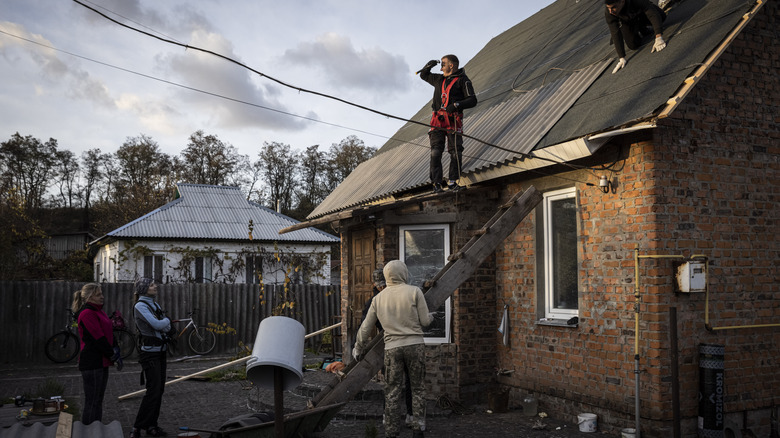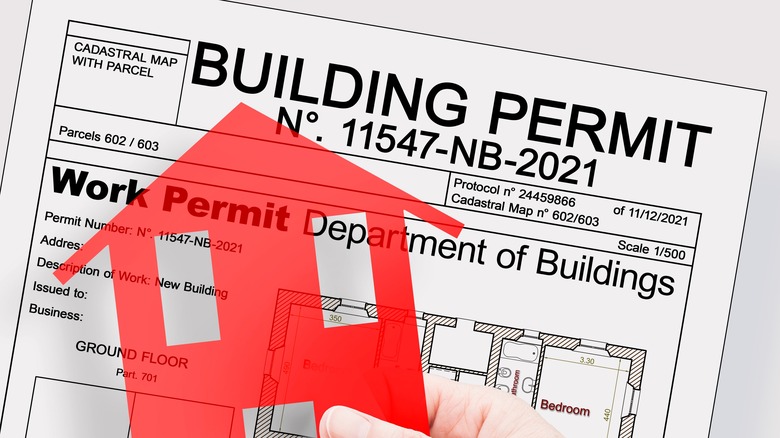The Most Common Mistakes Contractors Make
Hiring a good contractor can be tricky. There are plenty of horror stories floating around the internet about contractors who happily accepted an unlucky homeowner's deposit and the first couple of payment milestones, without doing any actual work. Or accounts of a contractor whose skillset was so shoddy that anyone with an ounce of interest in DIY projects could have likely done a better job.
The worst part is that even when you do your research and hire a great contractor, they are still vulnerable to making mistakes. The good news is that if you know what mistakes to keep an eye out for ahead of time, you can prevent most of them from happening. Some mistakes are avoided during the hiring process and just take a few more rounds of interviews and research to weed them out. Yet, others can be made by even the most seasoned of contractors and require healthy communication on both sides to overcome. We've dealt with many contractors in our day, so here are the most common mistakes they make (and how to easily fix them).
Contractors may underquote you
A mistake you see a lot with contractors is an incorrect quote for the services they plan to provide. This error can lead to surprises down the line. Underquoting is especially detrimental because someone's overall price is likely why you choose to work with them in the first place. Underquoting can happen for a variety of reasons. It's best to know what these reasons are ahead of time, so you can plan to avoid them.
The first is that damage is discovered during the work. This could be rotted wood, mold, or an issue with your property's easement. When this happens, speak to your contractor about adjusting the quote. Prices should not be exorbitant, yet should still comfortably cover their hourly rate and supplies. Experienced contractors call these contingencies and will usually have a clause in the original contract about them, but those newer to doing business might not. The second reason you may be underquoted is just poor planning on the contractor's part. If they told you the work should be done in 30 days, but you're now on day 45 simply because they are working slowly, then there should be more of a conversation around who pays for the time. It's important to get all quotes and adjustments in writing to avoid conflict down the line.
They may use a poorly-trained crew
When you hire a contractor for a smaller job, you usually just work with them directly. This means that if you want a built-in bookshelf installed, the person you researched and hired shows up, does the work for you, and goes home. However, if you are having larger work done, like getting your roof redone or your foundation fixed, you will be working with an entire team instead of just one person.
If you find yourself in this situation, be sure to check all credentials to avoid lousy work. You don't want the lead contractor to be a master of his craft, but be employing untrained workers to do the actual day-to-day repairs. When hiring, be sure to ask about the allocation of responsibility in the contractor's business. Does he subcontract work out to day workers? Does he have a full-time team that he knows well? Or, maybe it's a mix of the two. To avoid surprises and poor work, it's important to get the lay of the land beforehand. You can also check online review sites before hiring to get a good idea of how satisfied past clients have been with the completed work.
They may forget permits
In some areas, you need a renovation permit to complete work on your property. This could be construction permits for general works, fencing permits for structures above certain heights, plumbing permits, and the list goes on. Typically, counties and cities require these permits to ensure all construction work is safe and up to code. This means that it follows the general standards for safety and efficiency, as set out by the local governing body. The issuing of permits makes sure that shady work doesn't get done secretly, thus putting people in danger.
Sometimes, contractors will say that they can apply for all the necessary permits for you. Yet, a mistake that contractors can often make is forgetting to turn in all the paperwork so construction can start on time and legally. To avoid finding yourself in this situation, double-check what paperwork is required for the job. If you have a general idea of what needs to be filed, you will be able to pick up any mistakes quicker. In construction, time really is money, so these delays can be expensive if you don't actively avoid them.
They may misread plans
Something to be careful of when working with contractors is the way you communicate your plans. When you are doing a walk-through of the job site, it's easy to have a verbal back-and-forth about taking down walls, tile colors, and so on. However, to avoid a disaster, be sure to always have written instructions and agreements, instead of just verbal ones. It can be so easy to mishear someone, or even misunderstand what they are asking about.
Written plans also provide you and your contractor with a small insurance policy. If you are ever unhappy with the work being done, you can refer back to the written plan. If it differs, you know you are in the right and the contractor will need to fix the problem on their end. However, if you have a written plan and casually mention, "Oh, I was just thinking of doing this instead," it can be hard for them to keep track. This is especially true if you aren't their only client. Even if your contractor does call you to ask a question or approval, be sure to send a quick text or email right after the phone call to summarize what you talked about.
They may overschedule themselves
Something frustrating about working with contractors is that you often are not their only client. The worst part is that this is true across all job sizes. Whether you simply need help replacing the toilet, or are redoing your entire house, there might be a lot of downtime around the job. You may have to wait hours for the plumber to arrive because he booked too many people too close together, or your whole crew can't show up because they got rained out on their other site the day prior. If the crew you hire isn't good at managing time, you might be left waiting — or deal with rushed work.
While waiting for workers to show up can be tedious, it might not impact the overall quality of the finished product. However, a worker speeding through your tasks to get to their next client is unacceptable. When hiring contractors, speak to them in advance about their schedules. Do they work on more than one project at the same time? If so, how long do clients typically wait for a response, or for the workers to show up? Have a browse through past client reviews before you sign any contracts to get an honest idea of this, as well.
They may not ask before changing course
There is an old saying that goes, "Everything that can go wrong, will go wrong." In construction, this is usually true. Things that you did not plan for are going to come up during work. Your contractor might find mold in the HVAC system or wood rot in a load-bearing wall. They might even discover the tile you want to order won't be available for another six months.
Individually, none of these things are disasters. They are setbacks, but can usually be addressed without too much stress or financial hardship. The problem comes when contractors run into an issue like this and solve it on their own. In your job, your boss might like it if your show some autonomy in making decisions; however, when your home is on the line, it's more reasonable for you to always be consulted. To avoid this issue of your contractor making the wrong choice or one you have not agreed to, it's essential to have a plan for contingencies ahead of time. They should not just order the second choice tile because they assume you won't want to wait. They should always ask you — in writing — how you would like to move forward.
They may not always use the best quality materials
Sometimes contractors will "know a guy" when sourcing materials for your project. Typically, this means that they have an ongoing working relationship with a supplier of goods. This could be for drywall, insulation, tiling, or even roofing shingles. Before agreeing to exclusively use the industry contacts of your contractor, do a little bit more research on the nature of their relationship. Does your contractor receive any sort of financial gain from purchasing these supplies? This could be a commission on the sale, which they would keep entirely to themselves, or a small discount on items, which they are passing on to you.
If it's a commission situation, it's fair to ask why the contractor has chosen to partner with this particular supplier over all others. Based on their years in the industry, have they found this person to be the best in the business for the price point you are looking for — or are the two of them just cousins? If it's the latter, it might be a better idea to source the materials independently, instead of relying on their contacts.
They may damage other parts of your home
If you don't keep a close eye on things, an inexperienced contractor might accidentally damage other parts of your home. This could be a small fix, like tracking dirt across your carpet, or a larger one, like knocking over an heirloom vase. To avoid conflict, be sure to lay ground rules before work begins.
The first thing you need to do is establish what parts of your home the contractor and their team can have access to. If you are getting a new roof installed, can the team come inside to use the restroom, or should you rent a portable toilet for their convenience? If you are getting a new bookshelf put in downstairs, then you should make it clear you don't expect to see anyone upstairs. Yet, limiting access isn't the only type of boundary to establish — you can also set smaller rules, too. Things like no shoes in the house, or a request to wear shoe protectors are common ones to ask. These should all be discussed before work begins to avoid any awkward moments.
They may leave things incomplete overnight
If you are working on a long-term project with a contractor, such as a major renovation, it's possible that their working style could be different from what you expect. To the untrained eye, it might look like a contractor has left the site without finishing the job. If this was true, it would be a major mistake. However, for multi-day projects, it's possible your contractor didn't make a mistake. Instead, the work found a natural stopping point and they just needed to leave for the day. They didn't abandon it or do a poor job. It just appears that way, causing stress for the homeowner.
To avoid this, it's best to work with your contractor and schedule regular check-ins. At these check-ins — be they in person or over the phone — you can get an idea of how far along the timeline your project is. It also helps to set up milestones that are meant to be achieved around these check-ins. This way, you don't feel like you constantly have to nag your contractor for updates on the work's progress, or worry about things you see "undone" around the site. Instead, they have the space to do their job effectively and you can get some peace of mind.
They may try to work outside their expertise
A plumber, an electrician, and a bricklayer have very different skill sets and should be hired separately. When you are completing a major renovation of your home, you may need to hire each of these professionals. Yet, choosing a plumber who also dabbles in electricity is a bit like hiring a English teacher to tutor you in physics. Both are likely experts in their fields, but they don't always have the crossover skillset necessary to do good work.
Instead, be sure to interview and hire each of your contractors separately. Typically, those with good standing in the industry will be able to make recommendations to you for other tradespeople they often work with. If you enjoy the personality and quality of work from your first contractor, consider acting on their recommendation. The only reason you would not need to interview and hire your team separately is if you hire a general contractor that comes with a team of their own. In this instance, you would trust their reputation and portfolio, and that the team they choose to bring on board for your project is the same that produced the results you admired when doing your research.
They may not have the correct insurance
All contractors should have insurance that protects their business and workers in many different situations, and it should have multiple different clauses to cover extenuating circumstances. It is often called general liability insurance. You should ask your contractor if they have a policy before you hire them. It is also reasonable to ask to see a copy of the insurance certificate before you sign your contract.
General liability insurance covers the contractor should they break something in your home, injure you, or injure a neighbor or passerby. For general contractors with a team working under them, it can also serve as protection in workers' compensation-type incidents. If you work with a contractor that doesn't have insurance, it puts you at risk should there be an accident. If one of the workers hurts themselves on site, suddenly it's your homeowner's insurance policy that takes on the claim. And if you get hurt, you're typically out of luck. Sure, you can sue for damages, but if the contractor doesn't have an insurance policy, then it's unlikely that you are going to see the cash.
They may not be licensed
Not all states require that a contractor be licensed to practice their trade, but working with a licensed contractor is typically less of a headache. This is because it can be pretty easy to pick up a trade, but being "legit and legal" means there is more work going on behind the scenes. To receive a license from the state, an individual must take an exam to ensure they understand applicable state laws and best practices. They must also pass an extensive background check.
When working with a general contractor, sometimes they are the only one who holds a license, while their subcontractors do not. This means that all those workers are operating on the authority of their boss' license. Should anything go wrong, that person is legally bound to take responsibility for it. Just like insurance, it's reasonable to ask about a contractor's state license before hiring them. Request to see a copy of it before signing any contracts. If they do not have one, be careful about moving forward.












